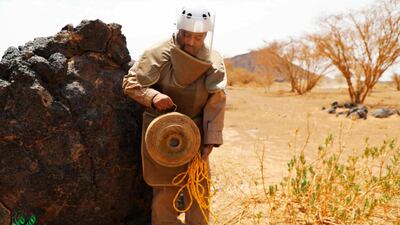Displaced Yemenis returning to liberated parts of Hodeidah say retreating Houthis left behind landmines, which have killed civilians and made entire districts unsafe.
Houthi rebels have controlled the critical port city on Yemen’s Red Sea coast since 2015.
Pro-government forces have been poised to retake the city since June, but amid fears of a humanitarian catastrophe, an offensive was delayed to give diplomacy a chance.
Pro-government troops advanced into southern districts of Hodeidah, but under the terms of a UN-brokered ceasefire reached in Sweden this month, both sides must withdraw from the city.
However, even if the opponents adhere to the ceasefire, displaced Hodeidah residents say the threat from landmines will stop many returning home.
Abdo Omar, 14, tried to go home two months ago. His family hired a minibus to return to Al Mansouria district, east of Hodeidah, from the displacement camp in which they were living in Khokha. But the vehicle hit a landmine on the way.
“My 14-year-old brother Yazan was killed and one of my sisters was badly injured,” said Abdo, who lost one of his legs in the blast.
Now living back at the displacement camp, he said his family were reluctant to try going home again.
“After losing our brother and a part of my body, we are fearful of ever getting back home,” Abdo said.
Another resident of Hodeidah who fled for the southern city of Mokha said his aunt was killed in a landmine explosion when she returned to her home.
“She went back to check on her house after it had stood empty for several years, but as soon as she stepped in the door she was killed by a mine,” said Nashwan Sha’wa, 23.
“Losing my aunt in such an unexpected way has caused tremendous fear for the whole family. We feel like mines could be hidden in any of our homes, so we don’t want to go home until we know our houses are not contaminated.”
Officials in Hodeidah called for the UN to send a demining team to the city.
“This must be taken seriously,” said Dr Ali Al Adhal, the director of public health in Hodeidah. “We’re asking for the UN to send deminers to help clear the city of these hidden killers.”
________________
Read more:
Yemen war: UN to convene Yemen rivals by video link regarding Hodeidah ceasefire
Yemen's Houthi rebels face a choice of military or political power
Head of UN ceasefire monitoring team arrives in Hodeidah
Joint Assessment Team defends Arab Coalition in Yemen
________________
A journalist in Hodeidah said that without demining, the ceasefire was unlikely to benefit residents.
"Thousands of displaced civilians won't go back home while the city is still contaminated by thousands of Houthi mines," said Fares Dokhn, who works for local website News Yemen.
“They will remain a threat for decades unless the UN and the Arab Coalition take serious steps to remove them.”
It is believed that the Houthis planted thousands of anti-tank and anti-personnel mines in farms around the city, along roadsides and in the desert, said Maj Gen Qaid Haytham, the executive director of the Mines Action Centre.
Abandoned homes, schools and government buildings in Hodeidah have also been mined, Maj Gen Haytham said.
“The mines planted by the Houthis are mostly unmapped except in some areas such as Bab Al Mandeb, where we found thousands of mines planted in an organised manner,” he said.
“But in the other areas, from Mokha up to Hodeidah, the mines were unmapped and randomly planted.”
In August, a Saudi organisation claimed that the Houthis may have planted one million mines and improvised explosive devices since 2015.
UAE demining teams reported in August that they had already cleared 40,000 such devices.

